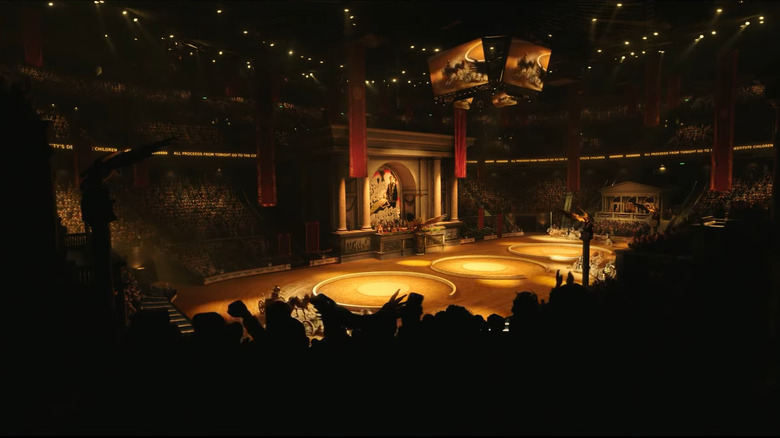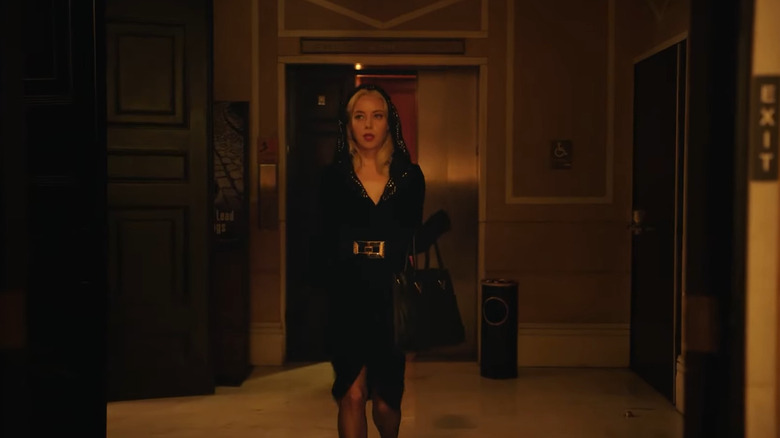Megalopolis Review: Objectively Bad But Audacious As Hell
You know how sometimes in movies about Hollywood they show a ridiculously convoluted film production to signal to the audience, “Hey, this director has gone a little too far into the weeds and everyone around him is helpless to stop it,” in a sort of visual shorthand? That’s “Megalopolis.” It’s easy to believe that this is the end result of a guy who’s been staring at the same script for nearly 50 years, tweaking and fiddling with it to the point that when he describes it to friends his casual pitch is nearly incomprehensible.
It would also be easy to believe that the famously beleaguered “Megalopolis” was made as part of an insurance fraud scam à la Springtime for Hitler in “The Producers.” But alas, no — this is an actual, honest-to-goodness passion project. It’s muddled in the extreme and few of its cast members make it out of the debacle unscathed, but its willful rejection of what audiences might want to see in favor of what Francis Ford Coppola wanted to make is so bold you almost have to admire it.
Coppola’s modern Roman fable
“Megalopolis” takes place in an alternative version of New York City referred to as New Rome, in which everyone is extremely committed to evoking the image of a modern-day Roman empire. Cesar Catalina (Adam Driver) is a tortured genius born into a privileged banking family who has recently won a Nobel Prize for the discovery of megalon, a new semi-organic building material that promises to be nigh-on indestructible. His dream is to use this miracle substance to build a new future with sustainable housing that meets the needs of all of New Rome’s citizens, not just the wealthy elite. Naturally, this proves unpleasant to many members of the wealthy elite — some of whom are in the pocket of Big Cement and Steel, others of whom, like the mayor (Giancarlo Esposito), dismiss his ideas as a pipe dream that won’t actually do any good.
Meanwhile, a political battle erupts for the heart and soul of New Rome, an epic fight between traditional politicians, power-hungry bankers, and those like Cesar who want to help people while also having an outlet for their genius. When Cesar teams up and falls in love with the mayor’s daughter, Julia (Nathalie Emmanuel), however, things reach a fever pitch between these warring parties.
Evoking the heyday of silent cinema
You remember in “Apollo 13,” when Ed Harris as NASA director Gene Krantz says, “What do we have on the spacecraft that’s good?” Maybe that’s the best place to start. It’s clear what Francis Ford Coppola is trying to do here, as he evokes the kind of over-the-top Hollywood epic that studios used to make back in the silent era. You know the type — massive sets, casts of thousands, pre-Depression opulence as the word of the day. But if in making “Megalopolis” as an urban epic morality tale Coppola sees himself as a successor to Fritz Lang, he’s missing the mark. Partially because the miracle of those old movies was to see filmmakers actually build gigantic sets and expertly maneuver their casts around them, while this movie — although it has some lovely Art Deco production design inspired by the recurring motif of the Chrysler Building — relies heavily on CGI. And also because the ideas in “Megalopolis” aren’t enough to build an epic blockbuster around. They’re mostly warmed over concepts that have worked better in other productions, and homages to films that clearly inspired Coppola when he was a young director.
Another key problem? It’s a well-known fact that Coppola has been trying to get this movie made for decades, which means that this story has been percolating in his head since the ’70s — and it feels like it. Parts of his modern fable feel hopelessly dated (his image of the glitzy parties of the young elites feel more like Studio 54 in its heyday than anything else), while others are shoehorned attempts to make the allegories feel modern and relevant (it has Shia LeBeouf as a would-be populist politician delivering a stump speech on a literal stump in the shape of a swastika, and that’s probably all we need to say about that).
Serious script woes
The weak script is also responsible for submarining a good portion of the cast, who simply aren’t able to deliver the film’s hackneyed dialogue. The entire production is done in a largely presentational style, where the actors serve as mere vessels for the words — only the words are nowhere clever enough to deserve it. Nathalie Emmanuel gets the worst of it as the female lead, choking out hopelessly earnest garbage in an accent that every once in a while sounds like it’s trying to be from New Jersey? Interestingly, the weirder and more intense an actor is, the better they manage to come across — Adam Driver and Aubrey Plaza (who plays the brilliantly named Wow Platinum, Cesar’s ambitious ex-lover, in a clear homage to Janet Snakehole), for example, seem almost at ease with Francis Ford Coppola’s bizarre dialogue. Kathryn Hunter as Julia’s mom (who also appeared in last year’s “Poor Things,” where she was equally delightful) is the closest anyone in the film gets to a natural performance.
Obviously, there’s a lot to unpack here. But to call “Megalopolis” bad isn’t quite fair either. It definitely is, don’t get us wrong, but it’s also so peculiar that you have no choice but to think about it for about a month after watching it. This may not be the swan song film Coppola dreamt of after decades of trying to get it made, nor is it the film that’s going to win Driver his Oscar. But there’s also something weirdly compelling in its flaws — after all, if your film can’t be great, you might as well make it so strange that audiences can’t entirely write it off. And to be frank, I’ve had a worse time sitting through much better movies.
“Megalopolis” premiered at the 2024 Cannes Film Festival. Wide release plans have yet to be announced.





